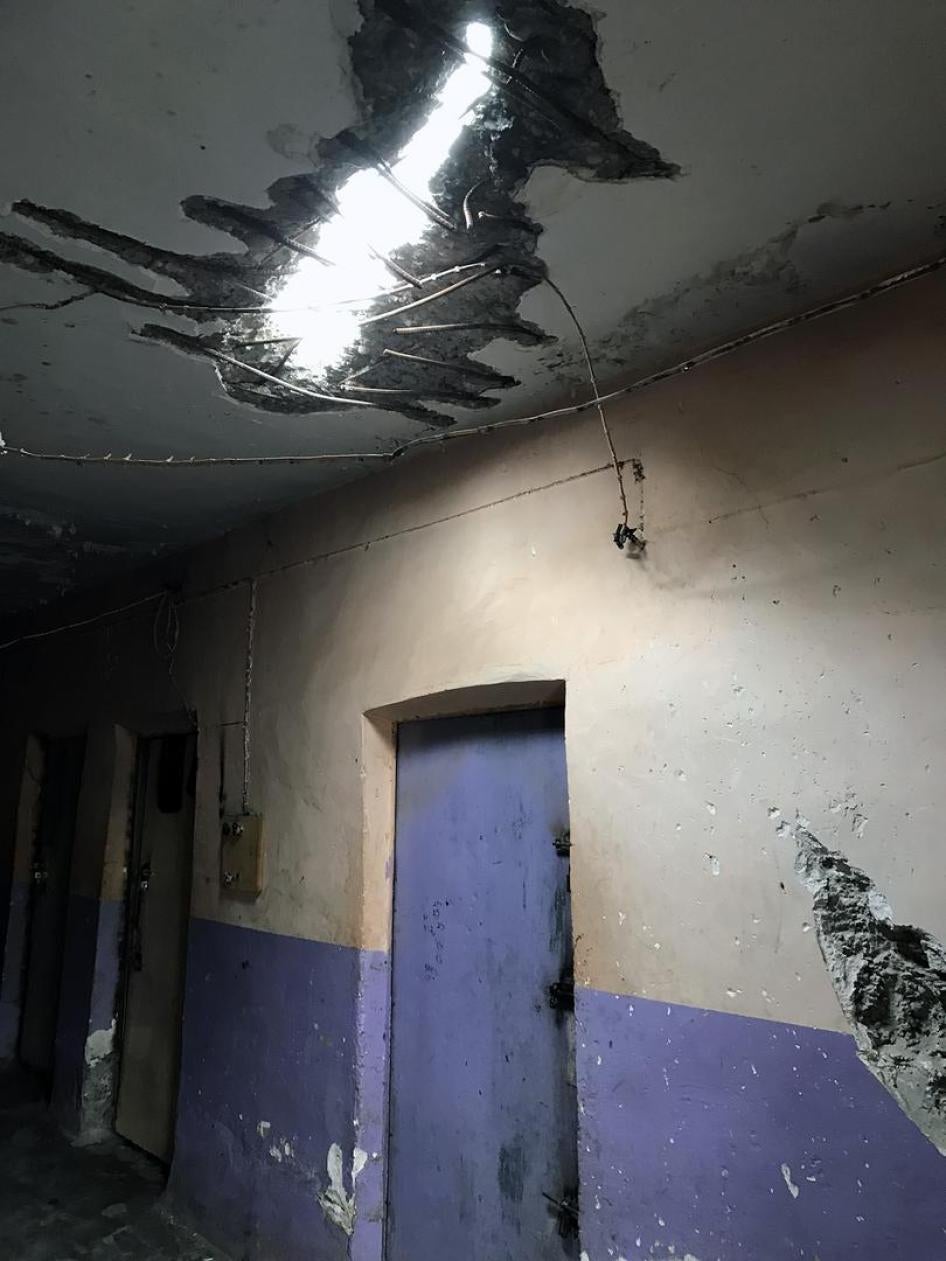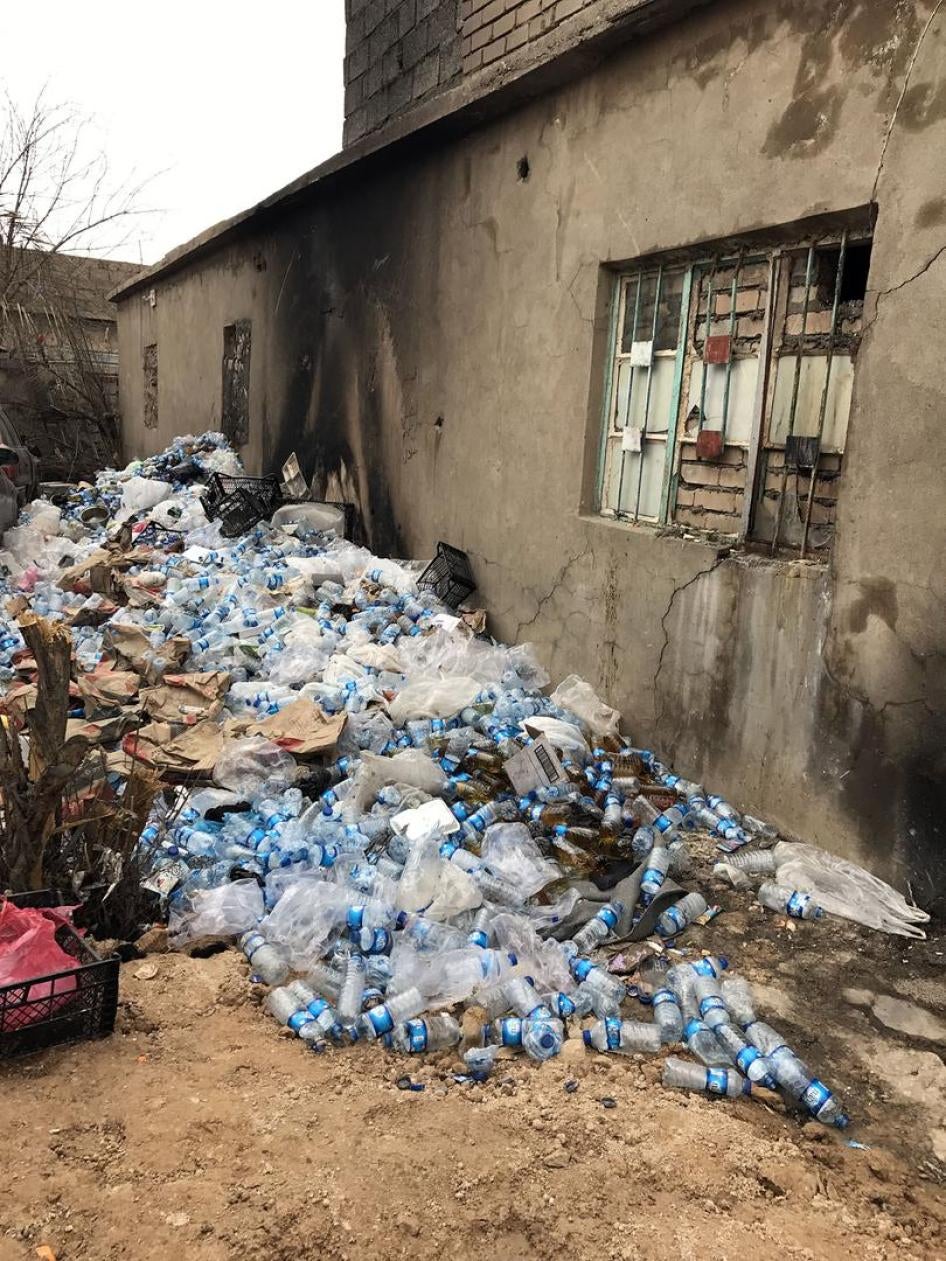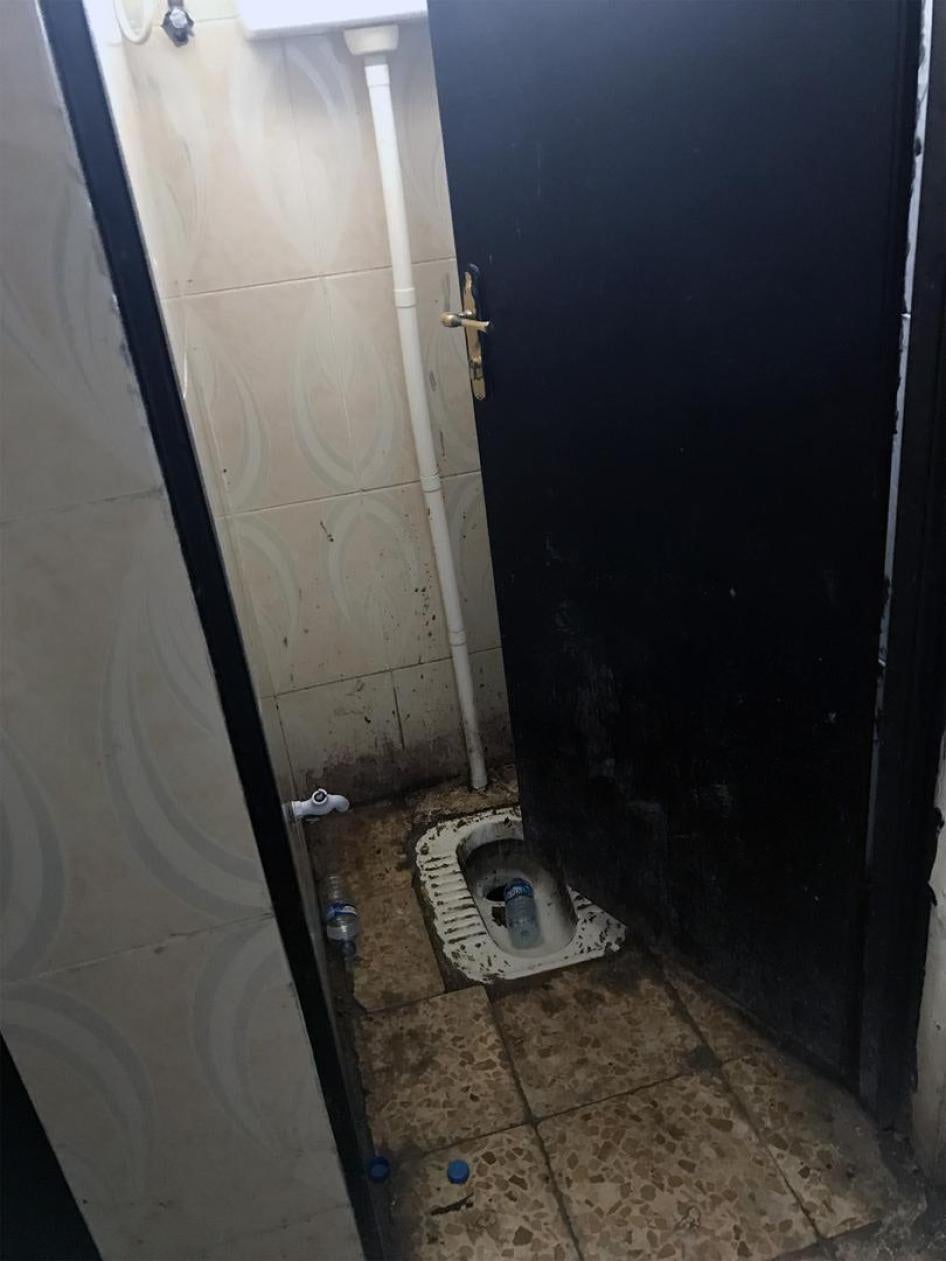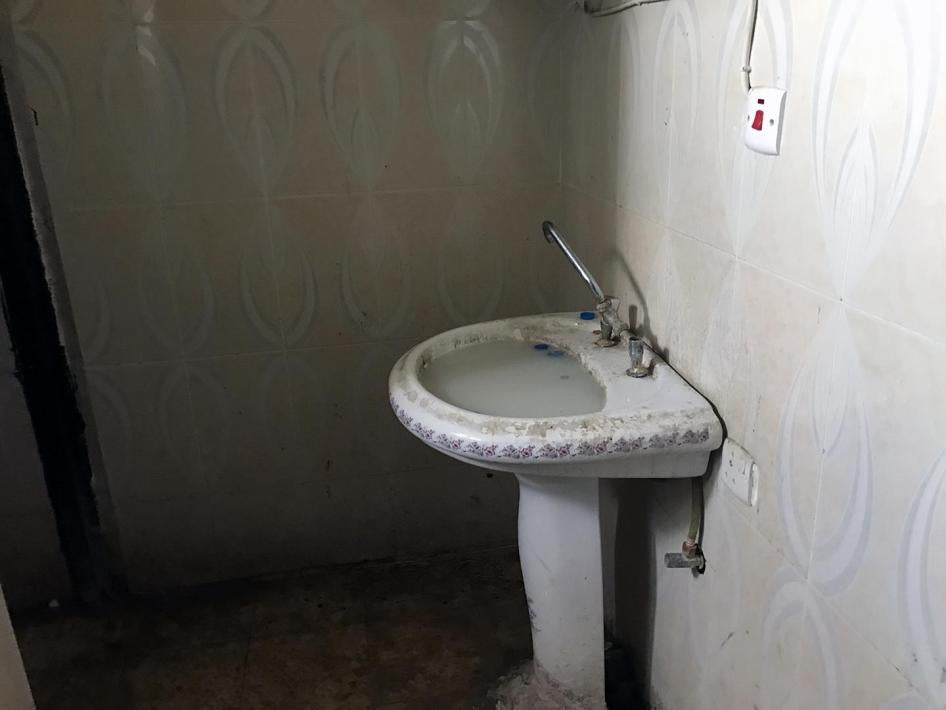(Erbil) – The Iraqi interior ministry is holding at least 1,269 detainees, including boys as young as 13, without charge in horrendous conditions and with limited access to medical care at three makeshift prisons, Human Rights Watch said today. At least four prisoners have died, in cases that appear to be linked to lack of proper medical care and poor conditions and two prisoners’ legs have been amputated, apparently because of lack of treatment for treatable wounds.
Two detention centers are in the town of Qayyarah, 60 kilometers south of Mosul, and the third at a local police station in Hammam al-Alil, 30 kilometers south of Mosul. At least one detainee has been held in Qayyarah for six months, with many others detained since November 2016. According to the Qayyarah prison staff, at least 80 of their detainees are children under 18, with the youngest being 13. Children are in Hammam al-Alil as well.
“The deplorable prison conditions in Qayyarah and Hammam al-Alil show that the Iraqi government is not providing the most basic detention standards or due process,” said Sarah Leah Whitson, Middle East director at Human Rights Watch. “Iraqis should understand better than most the dangerous consequences of abusing detainees in cruel prison conditions.”
On March 3, 2017, Human Rights Watch visited two of three houses in Qayyarah the Iraqi government has been using since retaking the area in August to detain men and boys suspected of being affiliated with the Islamic State (also known as ISIS). On March 12, researchers visited the local police station at Hammam al-Alil, which is holding 225 people accused of varying crimes, including ISIS-affiliation, in four rooms. Human Rights Watch was unable to interview detainees, but spoke to prison staff.
The prisons are under the authority of the Interior Ministry’s intelligence service, which provides services there together with the Justice Ministry. Staff said that Iraqi security and military services combatting ISIS hand over people they detain to the intelligence service, which holds the detainees in the facilities while individually interrogating them.
The intelligence service then takes the detainees before an investigative judge to assess whether there is enough evidence to bring charges for supporting ISIS under Provision 4 of the Federal Iraqi Counterterrorism Law (no. 13/2005). The judge then either orders their release or transfers the detainees to Baghdad to face charges.
Prison staff in Qayyarah said they had released about 80 detainees and transferred another 775 to Baghdad by early March 2017. Iraq’s Criminal Procedural Code (no. 23/1971) requires detaining authorities to bring detainees before an investigative judge within 24 hours. But Qayyarah prison staff said they had held some detainees for as long as four months, while Human Rights Watch learned of the case of the man held without charge for six months.
Prison staff in Qayyarah said that the investigative judge had cleared at least 300 men for release who are now being held unlawfully after the National Security Service, a security body under the prime minister with a mandate to screen people fleeing ISIS-controlled areas, intervened. Security forces’ failure to comply with a judicial order for release is a crime under Iraqi law. If the security forces are failing to comply with judicial orders in a systematic manner as part of a state policy to ignore such orders and detain people arbitrarily, this could represent a crime against humanity.
Prison staff in Hammam al-Alil said they had released 115 detainees and transferred another 135 to Baghdad. They said they have been holding at least 60 men since the detention site opened in November, 2016.
The prison staff and Justice Minister, Haidar al-Zamili, who met with Human Rights Watch on February 2, 2017, said that detainees held on terrorism charges have no right under the counterterrorism law (no. 13/2005) to communicate with their family during the investigation period, and that the Qayyarah detainees have not been allowed to communicate with their families. A local judge overseeing the cases told Human Rights Watch that once a detainee has been brought before the investigative judge, they have the right to contact their families, but that family visits are being delayed because of the delays in bringing detainees before the judge.
They also said that despite the Iraqi constitution and Criminal Procedure Code (no.23/1971) guaranteeing detainees the right to a lawyer during interrogations and hearings, none had been provided with a lawyer present during their interrogations and many did not have a lawyer during their hearings before the investigative judge.
Human Rights Watch observed that the facilities are all extremely overcrowded, so that no detainee can lie down to sleep. Because of the overcrowding and lack of proper ventilation, the makeshift prison cells are overheated, with an incredible stench. Detainees at the Hammam al-Alil prison called out to the visiting Human Rights Watch researchers, begging them to crack open the door because they said they could not breathe. The detainees have either no time or minimal time outside their cells, eat inside their cells, and have no access to showers and limited access to bathrooms. The facilities have no medical support, contributing to the deaths and amputations, prison staff said.
While the staff said they were trying to improve conditions, they could not reduce the overcrowding. The overcrowding may have been exacerbated due to a temporary freeze, in early 2015, on transfers of prisoners to Baghdad due to the cost of such transfers, a Qayyarah court official told Human Rights Watch on March 11, 2017. He said that the transfers had resumed in mid-January. Prison staff in Hammam al-Alil said that on March 11, they were asked to accept another 11 prisoners but refused, saying there was simply no more room.
One interrogator in Hammam al-Alil said that he sometimes beats ISIS suspects, and an observer who visited the prison in February 2017 said he witnessed the ill-treatment of three detainees.
Detainees charged and convicted may still be entitled to release under the General Amnesty Law passed in August 2016 (no.27/2016), staff said. The law offered amnesty to anyone who joined ISIS or another extremist group against their will, and did not commit any serious offense, like torture or killing. The head of the Iraqi parliament’s legal committee, Mohsen al-Karkari, told Human Rights Watch during a meeting on February 7, 2017, that it was a roundabout way to limit the scope of the wide-reaching Iraqi counterterrorism law and release of thousands of terror suspects. According to the Justice Ministry, authorities have released 756 prisoners since the law was passed.
Human Rights Watch learned from a reliable source that the Iraqi government had sent a committee to review conditions in the facility a few weeks before the Human Rights Watch visit. The committee promised to send up to 20 more interrogators from Baghdad, to speed up investigations. On March 2, 2017, 10 interrogators had arrived at the Qayyarah prisons.
The evidence documented by Human Rights Watch strongly suggests that conditions at the Qayyarah and Hammam al-Alil facilities are hazardous, unfit to hold detainees for extended periods of time, and do not meet basic international standards. As a result, holding detainees there probably amounts to ill-treatment. The state of the facilities and severe understaffing pose severe risks to the prisoners, the prison administration, and the local community.
The authorities should transfer all detainees from these facilities to official prisons built to accommodate detainees, and equipped to meet basic international standards. Until that happens, the Interior and Justice Ministries should, as an urgent priority, improve the conditions, and speed up the investigative process so that it can transfer the prisoners out of the facility as quickly as possible. The ministries should provide all detainees a medical screening upon arrival, and ensure access to medical care.
The authorities should also ensure that there is a clear legal basis for detentions, that all detainees have access to legal counsel, including during interrogation, and that detainees are moved to facilities accessible to government inspection, independent monitors, relatives, and lawyers, with regular and unimpeded access. They should immediately notify families of the detention of their loved ones and under which authority, promptly take detainees before a judge to rule on the legality of their detention, and immediately comply with any judicial order for release.
Judges should order the release of detainees or prisoners being held in inhuman or degrading conditions.
When prosecuting children alleged to have committed illegal acts, they should be treated in accordance with international juvenile justice standards. International law allows for authorities to detain children pretrial in limited situations, but only if formally charged with committing a crime, not merely as suspects. The authorities should release all children not yet formally charged.
“The Iraqi authorities should immediately release the children it is holding in these hellholes unless they promptly charge them with a crime,” Whitson said. “Iraq should recognize and treat children accused of ISIS affiliation as the victims of illegal and unconscionable recruitment and exploitation by the group.”
International Law on Detention
International law governing the treatment of prisoners strictly prohibits cruel, inhuman, or degrading treatment or punishment. The international norms regarding prison conditions are set out in the United Nations Standard Minimum Rules for the Treatment of Prisoners (the “Mandela Rules”). The rules require that “[a]ll accommodation provided for the use of prisoners and in particular all sleeping accommodation shall meet all requirements of health, due regard being paid to climatic conditions and particularly to cubic content of air, minimum floor space, lighting, heating and ventilation.”
They also state that, “[t]he sanitary installations shall be adequate to enable every prisoner to comply with the needs of nature when necessary and in a clean and decent manner,” and that “[a]dequate bathing and shower installations shall be provided.” “The provision of health care for prisoners is a state responsibility. Prisoners should enjoy the same standards of health care that are available in the community,” the rules state. Rule 58 protects a prisoner’s right to receive visits “at regular intervals” from family and friends.
Under Iraqi law, the High Judicial Council is responsible for monitoring prison conditions, while the ministries in charge of facilities are responsible for maintaining the conditions inside. The High Judicial Council should fulfil its mandate in monitoring these facilities. Iraq should ratify the Optional Protocol to the Convention against Torture allowing independent international experts to conduct regular visits to places of detention in Iraq and provide for the creation of an independent inspectorate.
Special Provisions Regarding Child Detainees
In particular, children should enjoy full due process guarantees, including access to counsel, the right to challenge their confinement, contact with their families, and separation from adult detainees. Any punishment for criminal offenses should be appropriate to their age, and be aimed at their rehabilitation and reintegration into society.
It is important to note that some of the child detainees may have committed acts of violence while simultaneously being victims of ISIS. The Office of the Special Representative of the Secretary-General (SRSG) for children and armed conflict said in 2011 that when dealing with children who took part in armed groups “more effective and appropriate methods, other than detention and prosecution are encouraged, enabling children to come to terms with their past and the acts they committed.”
The government should also consider how to treat children accused of membership in a group like ISIS, but not of any specific violent act. In 2016, the UN secretary-general criticized countries for responding to violent extremism by administratively detaining and prosecuting children for their alleged association with such groups. He noted that such deprivation of liberty is contrary to the best interests of the child and can exacerbate community grievances.
The special representative of the secretary-general for children and armed conflict, Leila Zerrougui, has also stated that child soldiers should not be prosecuted “simply for association with an armed group or for having participated in hostilities.” Many countries worry that children who are ISIS members pose a future threat. But prosecution and detention of a child should always be a measure of last resort, and the purpose of any sentence should be to rehabilitate and reintegrate the child into society.
Qayyarah Prisons
In one Qayyarah detention facility, a room approximately 4 by 6 meters held 114 men, and in the other a room 3 by 4 meters held 38. They have no furniture or mattresses, with insufficient space for detainees to lie down to sleep. One prison houses 374 detainees within six rooms. The other facilities are smaller. The room with 114 detainees has a single toilet and blocked off windows. It had no ventilation system until early March 2017, when the prison director broke two small holes in the walls and installed ventilation fans. Despite these improvements, the smell is overwhelming. The detainees in the other five rooms share another single toilet.












